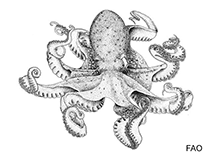Graneledone challengeri (Berry, 1916)
Warning: DOMDocument::load(): SSL operation failed with code 1. OpenSSL Error messages: error:140770FC:SSL routines:SSL23_GET_SERVER_HELLO:unknown protocol in C:\Apache24\htdocs\includes\SpeciesSummary.lib.php on line 1236
Warning: DOMDocument::load(): Failed to enable crypto in C:\Apache24\htdocs\includes\SpeciesSummary.lib.php on line 1236
Warning: DOMDocument::load(https://sealifebase.nrm.se/webservice/AquaMaps/getAMap.php?genus=Graneledone&species=challengeri): failed to open stream: operation failed in C:\Apache24\htdocs\includes\SpeciesSummary.lib.php on line 1236
Warning: DOMDocument::load(): I/O warning : failed to load external entity "https://sealifebase.nrm.se/webservice/AquaMaps/getAMap.php?genus=Graneledone&species=challengeri" in C:\Apache24\htdocs\includes\SpeciesSummary.lib.php on line 1236
Hochladen Photos
Google Bild | No image available for this species;
drawing shows typical species in Octopodidae.
Google Bild | No image available for this species;
drawing shows typical species in Octopodidae.
Classification / Names Common names | Synonyms | CoL | ITIS | WoRMS
| Octopoda | Octopodidae | Graneledoninae
Environment: milieu / climate zone / depth range / distribution range Ökologie
; tiefenbereich ? - 700 m (Ref. 106682). Polar
Verbreitung Länder | FAO Gebiete | Ecosystems | Vorkommen | Einführungen
Western Pacific and Antarctic waters. Temperate to polar climates.
Length at first maturity / Size / Gewicht / Alter
Maturity: Lm ? range ? - ? cm
Life cycle and mating behavior Geschlechtsreife | Fortpflanzung | Ablaichen | Eier | Fecundity | Larven
Members of the class Cephalopoda are gonochoric. Male and female adults usually die shortly after spawning and brooding, respectively. Mating behavior: Males perform various displays to attract potential females for copulation. During copulation, male grasp the female and inserts the hectocotylus into the female's mantle cavity where fertilization usually occurs. Life cycle: Embryos hatch into planktonic stage and live for some time before they grow larger and take up a benthic existence as adults.
Hauptreferenz
Referenzen | Koordinator | Partner
Kommritz, J.G. 2000. (Ref. 1981)
IUCN Rote Liste Status (Ref. 130435)
nicht bedroht (LC) ; Date assessed: 14 July 2015
CITES Status (Ref. 108899)
Not Evaluated
CMS (Ref. 116361)
Not Evaluated
Bedrohung für Menschen
Nutzung durch Menschen
| FishSource |
Tools
Mehr Information
Alter/Größe
Wachstum
Länge-Gewicht
Länge-Länge
Morphologie
Larven
Dichte
Wachstum
Länge-Gewicht
Länge-Länge
Morphologie
Larven
Dichte
Internet Quellen
BHL | BOLD Systems | CISTI | DiscoverLife | FAO(Publication : search) | Fishipedia | GenBank (Genom, nucleotide) | GloBI | Gomexsi | Google Books | Google Scholar | Google | PubMed | Tree of Life | Wikipedia (Gehe zu, Suchen) | Zoological Record



